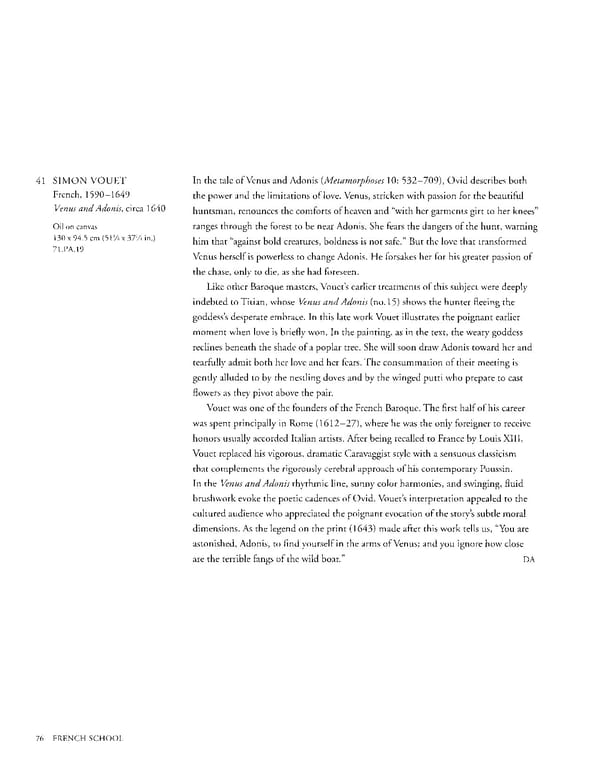41 SIMON VOUET In the tale of Venus and Adonis (Metamorphoses 10: 532—709), Ovid describes both French, 1590-1649 the power and the limitations of love. Venus, stricken with passion for the beautiful Venus and Adonis, circa 1640 huntsman, renounces the comforts of heaven and "with her garments girt to her knees" Oil on canvas ranges through the forest to be near Adonis. She fears the dangers of the hunt, warning 130x94.5 cm (51¼ x 37¼ in.) him that "against bold creatures, boldness is not safe." But the love that transformed 71.PA.19 Venus herself is powerless to change Adonis. He forsakes her for his greater passion of the chase, only to die, as she had foreseen. Like other Baroque masters, Vouet's earlier treatments of this subject were deeply indebted to Titian, whose Venus and Adonis (no. 15) shows the hunter fleeing the goddess's desperate embrace. In this late work Vouet illustrates the poignant earlier moment when love is briefly won. In the painting, as in the text, the weary goddess reclines beneath the shade of a poplar tree. She will soon draw Adonis toward her and tearfully admit both her love and her fears. The consummation of their meeting is gently alluded to by the nestling doves and by the winged putti who prepare to cast flowers as they pivot above the pair. Vouet was one of the founders of the French Baroque. The first half of his career was spent principally in Rome (1612—27), where he was the only foreigner to receive honors usually accorded Italian artists. After being recalled to France by Louis XIII, Vouet replaced his vigorous, dramatic Caravaggist style with a sensuous classicism that complements the rigorously cerebral approach of his contemporary Poussin. In the Venus and Adonis rhythmic line, sunny color harmonies, and swinging, fluid brushwork evoke the poetic cadences of Ovid. Vouet's interpretation appealed to the cultured audience who appreciated the poignant evocation of the story's subtle moral dimensions. As the legend on the print (1643) made after this work tells us, "You are astonished, Adonis, to find yourself in the arms of Venus; and you ignore how close are the terrible fangs of the wild boar." DA 76 FRENCH SCHOOL
 Masterpieces of the Getty Museum: Paintings Page 76 Page 78
Masterpieces of the Getty Museum: Paintings Page 76 Page 78